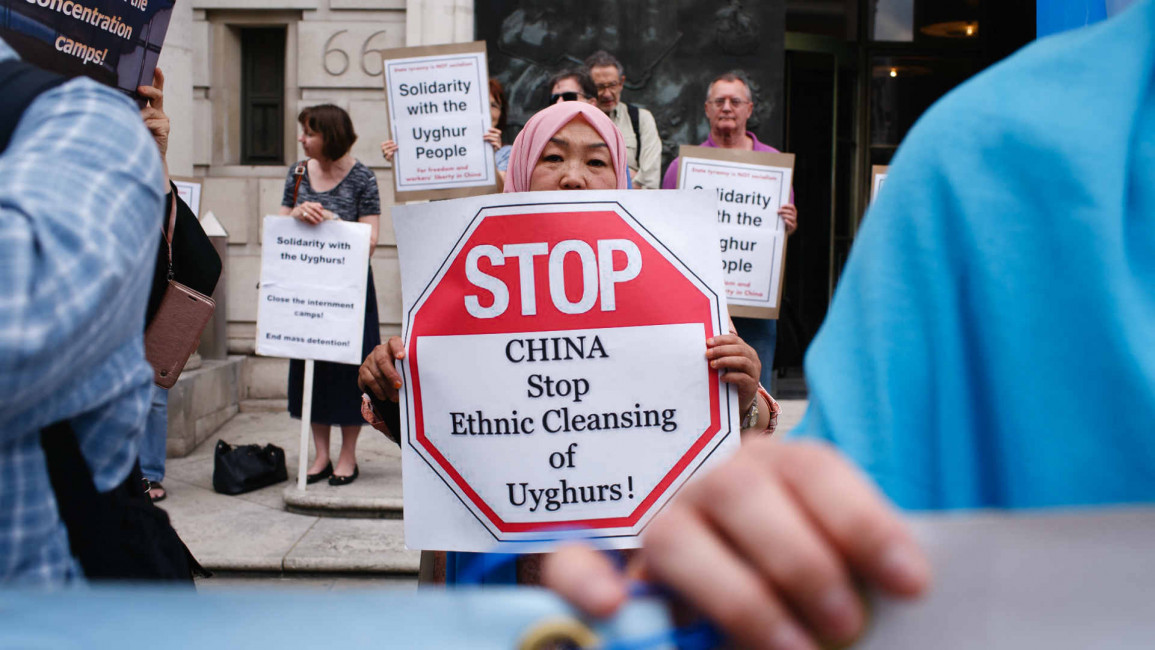
Uighur Muslims abroad are refugees fleeing China's oppression. Don't send them back under any circumstances
It's been more than two years since China demanded all Uighur citizens in China hand their passports to the police, a move that launched the ongoing mass detention of Muslims in Xinjiang. Now, an ever increasing number of Uighurs who have found temporary refuge in neighboring countries are faced with yet another chilling prospect: an expiring Chinese passport.
Compounding their paralysing fears over an expired or soon-to-be-expired passport is the fact that China refuses to renew their passports at any of its foreign consulates, thus demanding the holder return to Xinjiang.
But no Uighur in his or her right mind would be willing to make this journey, knowing full well that detention in one of the region's concentration camps could be their fate.
This, however, puts these Uighur expatriates and asylum seekers in a double bind. If they return to Xinjiang, they are damned. If they stay where they are, it will be so with an expired passport, which exposes them to the likelihood of being deported back to China, where certain interrogation, abuse, and imprisonment awaits.
For instance, Egypt deported dozens of Uighur students in 2017 after China demanded they return home, but not one has since reported being free. In fact, the fate of all remains completely unknown.
In fact, Egyptian authorities willingly arrested and deported as many as 90 percent of the estimated 7,000 to 8,000 Uighurs living in Egypt because Cairo and Beijing had signed a cooperation agreement in security matters in mid-2017, one requiring both parties to share information in regards to extremist and terrorist organisations.
 |
It's clear why the effort by so many countries to normalise China's behavior has so many Uighur outside of their home country deeply frightened for their immediate future. |  |
That 50 countries have now signed a joint letter to the president of the UN Human Rights Council and the UN High Commissioner for Human Rights that essentially expresses their support for China's repressive policies against Muslims in Xinjiang has Uighur expatriates and asylum seekers throughout the world in a severe panic.
"Faced with the grave challenge of terrorism and extremism, China has undertaken a series of counter-terrorism and de-radicalisation measures in Xinjiang, including setting up vocational education and training centers. Now safety and security has returned to Xinjiang and the fundamental human rights of people there have enjoyed stronger senses of fulfillment, happiness and security," claimed the joint letter signed by 50 countries, including Saudi Arabia, Iran, Iraq, Pakistan, UAE and others.
In-depth: Why Muslim countries are turning their back on China's repressed Uighurs
The truth of the matter is there's only one reason why the political leadership of these respective countries have put their signature to this letter: they each are dependent on China's investment and thus fear punitive economic measures in return for speaking out against Beijing’s repressive polices against the Uighur.
|
But if these countries truly believe what they say publicly – that the Uighur in Xinjiang have a "stronger sense of fulfillment, happiness and security" because of China's concentration camps – then what will stop them deporting Uighur expatriates and asylum seekers who hold expired travel documents?
It's clear why the effort by so many countries to normalise China's behaviour has so many Uighurs outside of their home country deeply frightened for their immediate future.
"There are already hundreds of Uighurs in a limbo outside of China waiting to be deported back to their country of origin. It is well known, what is awaiting them: These individuals will immediately be detained upon their arrival by the Chinese border control," observes Uyghur Aid, a grassroots organisation comprising ethnic Uighurs of all religious and ethnic backgrounds.
The group says that in the eyes of the Chinese government, the mere act of living abroad constitutes a crime deserved of imprisonment upon return, and those who are forced to return, "simply disappear".
With an expired passport and travel documentation, however, these Uighurs are essentially stuck in a foreign country without any contact with their family members in China. It has become all but impossible for non-detained Uighur in Xinjiang to maintain contact with those outside of the country, out of fear they too will be arrested and detained.
 |
When I spoke with Dilnur Kurban, a Uighur who has lived in Vancouver, Canada since 2011, she told me how and why it had become impossible to maintain contact with her parents, who remain in Xinjiang.
"Their calls, like all Uighurs', are monitored, so it's no longer safe to talk to them over the phone," said Kurban.
Kurban explained to me how she devised a plan to speak to her father earlier this year, which included having a friend in China call a family member at an event she knew her father would be attending, but when he answered the phone, he told her, "I was told not to talk to you," before hanging up.
Kurban said that while the telephone call "broke her heart," she took comfort from the fact that at least he wasn't being detained in a concentration camp, a fate that has befallen both her brother and brother-in-law.
 |
Turkey and other countries which host Uighur migrants must make allowances for the way in which they treat those who have entered the country with valid travel documentation. |  |
Thankfully, Kurban has attained permanent residency in Canada, but tens of thousands of Uighur expatriates have not. Their fears typified in this account given to Middle East Eye by a Uighur who currently lives in Turkey:
"The Turkish government gave an extension to our residency, but that ran out in May 2019. She [my wife] then received a paper saying they will be deported in ten days and she is now living with my children in the shadows, where they hide from the police to avoid being taken back to China."
Clearly, Turkey and other countries which host Uighur migrants must make allowances for the way in which they treat those who have entered the country with valid travel documentation (Editor: last week, Doha refused to bow down to requests from China and rejected the deportation of Ablikim Yusuf, a Uighur man who had fled China). They are refugees who seek to extend their stay in order to escape persecution in China and to contribute to their betterment of their host country.
To treat them any differently is to be complicit in their ultimately doomed fate.
Follow him on Twitter: @cjwerleman
Opinions expressed in this article remain those of the author and do not necessarily represent those of The New Arab, its editorial board or staff.




